On my escape from the Sinn Feiners I was transferred to England and given command of the 11th. Infantry Brigade at Colchester.
PARTICULARS OF EXPERIENCE AND TESTIMONIALS OF COLONEL CUTHBERT HENRY TINDALL LUCAS C.B., C.M.G., D.S.O. COLONEL COM- MANDANT 11TH INFANTRY BRIGADE. Application for the post of Chief Con- stable of Nottingham 13th November, 1922.
CHTL and Poppy finally got their wish and were able to settle down with their son and enjoy some family time together. The job CHTL had been given was far less stressful than the Irish command had been. They set up their home in Colchester, as they had in Cologne, and at last lived a more peaceful life, free from the worry of war and conflict. They discovered the delights of parenthood with young Bill and were keen to expand their family further.
One of the highlights of the year following his escape was CHTL receiving his CB. In spite of how Churchill had felt about him, there were enough people in high places who had used their influence and made sure that CHTL was rewarded for his work. It was probably politically important to show that CHTL wasn’t a failure in any way and that his heroic escape had redeemed him. Dressed in an elegant gown, which hid her rapidly growing bulge, Poppy joined CHTL at the palace to receive the award.
Barely twelve months after Bill was born, Bob (Robert Holdsworth Tindall Lucas) bounced into the world on 11th July 1921.
CHTL’s two sons were inseparable, often in trouble, Bob much more than Bill. Poor Poppy found the boys quite a handful. Once at her wit’s end, when, left on her own with them without their father’s stern rebuke to snap them into line or dear Nanny Gilbert’s skilful handling of them, Poppy resorted to getting out her hairbrush to discipline Bob. Unfortunately Poppy used the wrong side of her hair brush. Nanny returned and was horrified to see what looked like a small bottom covered in German measles and sought at first to comfort Bob believing him sick, rather than to chide him for his misdeeds! She also had to console and reassure a distraught Poppy who was appalled at the result of her attempts to chastise her son. The hair brush rash soon disappeared but Bob milked it for all it was worth while it lasted!
Family Celebrations
In 1923, the Tindall Lucas clan gathered together to celebrate William and Frances’ Golden Wedding. The family had been through some very tough times, but they were still able to celebrate the good. A photo of the happy couple surrounded by their children and their spouses was taken on the steps of The Hall in Welwyn. The grandchildren were nowhere to be seen, probably being entertained by nurses and nannies, to give the elderly couple a little peace and quiet!
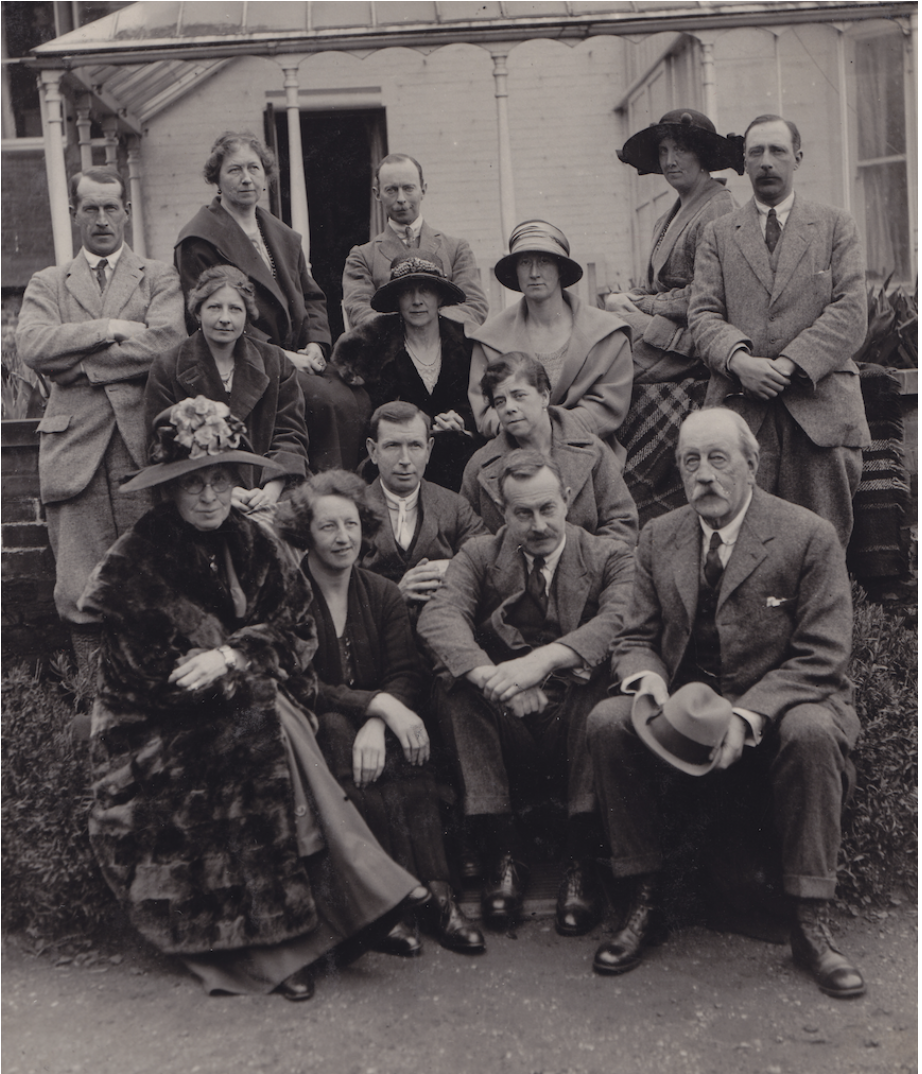
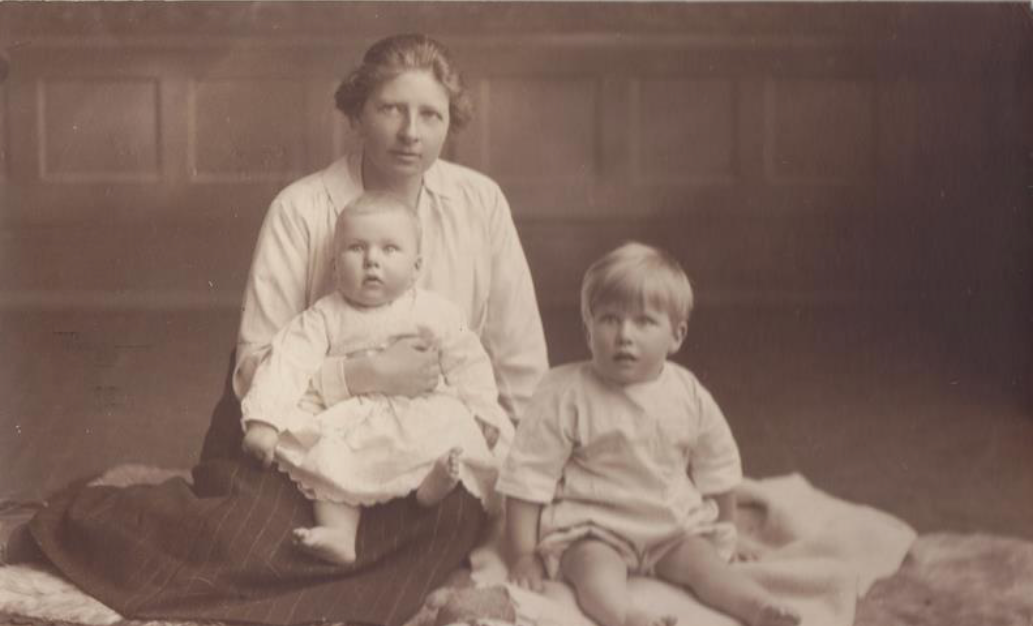
Anne, the general’s much loved only daughter, appeared five years after Bob. She was adored by her father, who always had a soft spot for little girls, and consequently she was ‘spoilt rotten’.
Anne had a governess who could be quite unkind to her behind closed doors. Deciding for once to be her protective big brothers rather than just her tormentors, Bill and Bob decided to find a solution to little sis’ problem by taking direct action. They managed to smuggle a couple of small mice into the governess’s top drawer. Problem solved! It was worth the trouble: in all the furore that followed Poppy realised that the governess wasn’t the nice person she thought she was when she first employed her.
The rapidly departing governess got some comfort from seeing two boys in disgrace and their mother despairing at where she would find another governess at short notice! Anne was the only one who was extremely pleased with the outcome!
A return to Germany
In 1927 CHTL was appointed Colonel on staff, at the General Headquarters of the Rhine Army in Cologne. Poppy was delighted to be returning to the place where she and CHTL enjoyed their first real experience of living as a married couple. She had loved that time and was only too sorry when it was curtailed and CHTL was sent to Ireland. Returning to Germany meant that life was once again lived free from family interference. This period of her life, Poppy said, was her happiest.

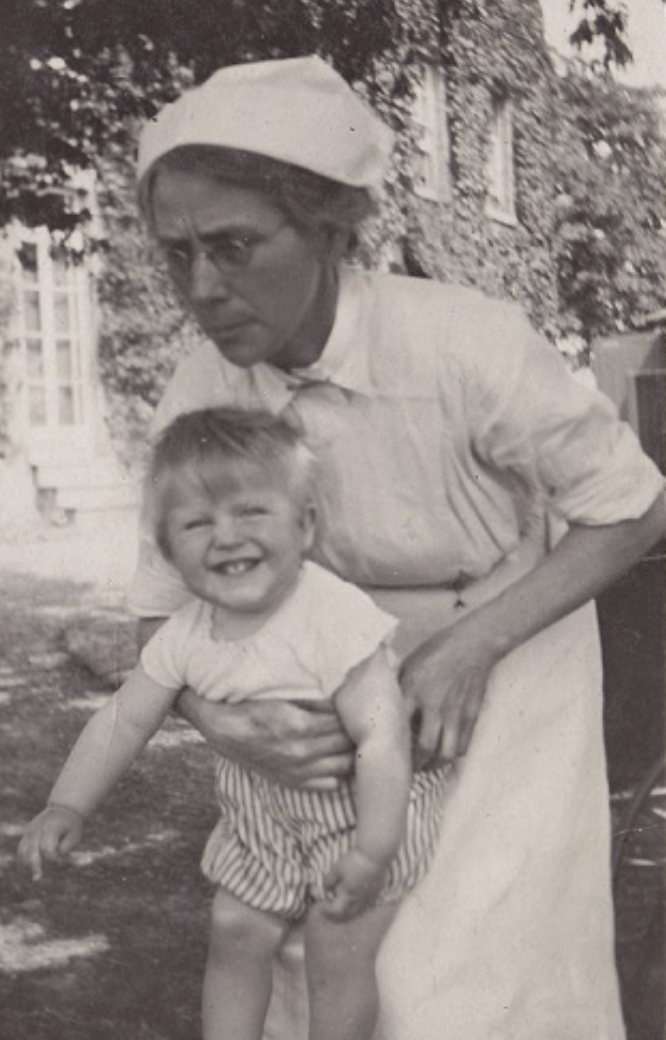
The family lived in luxury, being billeted in an impressively grand German house. Nanny Gilbert accompanied them to Cologne and was a much valued member of the household. They had a wonderful German chef who Poppy wanted to bring back to England with them. The chef didn’t want to leave his family and also must have been nervous about moving to the land of his former enemies, so turned down her offer.
One of the special privileges that went with CHTL’s rank was that he was entitled
to a box at the opera. Opera wasn’t much to CHTL’s liking, but Poppy adored it and made the most of the best seats in the house. The children enjoyed a wonderful, active life in Germany. The boys had ponies to ride and they thrived on the outdoor life. During the winter months Poppy and CHTL took their family skating on the frozen Rhine. The river was very crowded and on one occasion a very small Bob was floored by a couple of rather portly Germans. Realising that they had knocked over a British officer’s son and not seeing the General, the German skaters picked up the sobbing Bob and tried to pacify him by feeding him cream cakes and beer. The General finally found his missing son, none the worse for his fall but quite likely worse the wear from his new German friends’ misguided treat! Poppy would have been horrified at her young son’s introduction to alcoholic beverage, but CHTL was very amused!
During this time the General was in great demand for children’s parties. He had a wonderful way with children and was a captivating entertainer. He adored Walt Disney films and took his children to each new film as they were released, as much for his own amusement as for his children’s.
Bill and Bob found their father fun but also very strict and he applied army-style discipline. When the boys were struggling with bed wetting, their father awarded the boy with a dry bed a medal in the morning. It took poor Bob sometime to claim his reward but it meant so much once he got his hands on the medal. There was a ‘stiff upper lip’ policy and feelings were not discussed. Any man who had fought at the Front never came home untouched by the horror of it. CHTL had been through virtually all of the bloodiest battles, he’d seen terrors that must have haunted him for the rest of his life. He dealt with it all by pushing the worst feelings aside, never talking about them, and using his grandfather’s ‘Je me hâte de rire de tout - de peur d’en pleurer’ motto to lighten dark days.
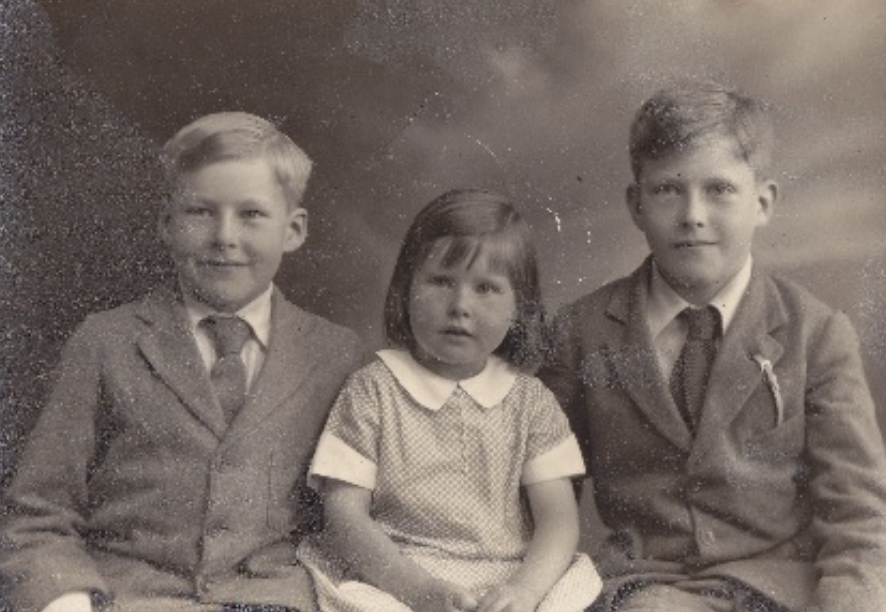
In 1929, with the Army of the Rhine downsizing, there were few senior jobs available. In recognition of his achievements and loyal exemplary service, plus as a consolation for the lack of promotion opportunities, CHTL was awarded the rank of Major-General.
CHTL received many congratulatory letters from colleagues including one from French General Guillaumat.
My dear general,
I learn with a very great pleasure of your nomination to the rank of major- general. I send you with our most cordial congratulations and I can assure you that all of our officers who you know share my satisfaction and they too send you their compliments. We only regret having to leave you.
Your most devoted, Guillaumat
Letter written in French found in CHTL’s papers, handwriting deciphered by Christiana Betrand, translation from French by Phil Wheeler
Marie Louis Adolphe Guillaumat (January 4, 1863 May 18, 1940) was a French Army general during World War I. After the Armistice, Guillaumat was appointed Commander in chief of Allied occupation forces in the Rhineland. As described in Bob’s letter there had been a harsh winter on the Rhine in 1928/9. Some of the French soldiers had frozen to death and General Guillaumat was blamed for his failure in not providing adequate provisions to ensue that the troops were protected. The letter had been written late February 1929 - just around the time that the General was beginning to face severe criticism.
Another letter congratulating CHTL on his promotion was one from Sir William Seeds. In 1928 Seeds had become British High Commissioner for the Rhineland in Coblenz. His job was mainly to arrange the evacuation of British troops as the tenure of their occupation of Germany came to an end. Sir William was known “not to suffer fools gladly, nor always sufficiently restrain his brilliant wit” so would have enjoyed CHTL’s company. He was someone else who had succumbed to the Rhineland flu, along with Aunt Dina, Anne and two maids.
INTER-ALLIED RHINELAND HIGH COMMISSION, BRITISH DEPARTMENT, COBLENZ
February 26, 1929
My dear Lucas,
I take this first opportunity of return to work after a dose of influenza to send you our best congratulations on your recent promotion.
Please accept our best wishes for the future if the promotion entails, as presumably it will do to all our loss, your departure from the Rhineland.
Yours very sincerely Williams Seeds,
Sir William Seeds KCMG (1882–1973) was a British diplomat. He served as Ambassador to both Russia and Brazil. Sir William entered the British Diplomatic Service in 1904 and served in Washington, Peking(1908-9), Stockholm (1910), Athens(1911–13), Lisbon(1913– 1919), Berlin (1919), Bavaria (1920), Munich, Colombia (1923-1925), Venezuela(1925- 1926), Albania (1926-28).
The only job offered to CHTL in the army was a posting to India. He was very reluctant to take it. He had so enjoyed the role of father, seeing his boys grow up and develop their characters: he didn’t want to miss out on the next stage of their lives. Bill and Bob were setting off to prep school and if he took off to India with Poppy and daughter Anne, the boys would be left behind to be educated in England.
CHTL was advised to take a break for a while to see whether anything else might come up later on. He decided to go to Scotland to live a quiet life with Poppy and Anne, spending his days shooting and of course fishing. He sent freshly caught salmon down for the boys to share with their friends at their Prep School. There was still residual notoriety surrounding Bill and Bob’s father as the general who escaped from the IRA, and the boys enjoyed a little kudos among their peers for having him as their pater, as well as the goodwill generated by generous helpings of salmon the infamous general treated their classmates to!
Cheam
In 1929 Bill and Bob went to Cheam Preparatory school in Surrey. CHTL didn’t view sending his sons to school as a convenient way to get them out of the way as he put himself out to visit them. He had the curious attitude of wanting the boys to do well, but not too well that they ’burnt their brains out before they left school’. (Bob’s words)
Boarding school life came as a shock to the boys’ systems. It took Bob a little while to settle down:
Dear Mummy
I hate school I don’t want to come back next term I don’t minde work. I haven’t played football yet I don’t know about to safer noon I am getting on quit well.
I wish I hadent put the first pranergraf
With love from Lucas Miner
Gradually even Bob began to enjoy Cheam; especially as he began to excel in some lessons and build relationships with other boys and one of his teachers. A much more mature Bob wrote again to his mother - no longer just ’Lucas Miner’ which must have been a constant bug bear for Bob- forever destined to living in his older brother’s shadow: now he was the confident ’your son R.H Tindall Lucas’ someone with his own identity and with some achievements under his belt!
Cheam School Surrey 16th of March
Dear Mother
I am the very first in my class for Maths and 5th in Latin. Mr taylor is buying a new electric organ and they are building a hut for its engine and pipes for the pumped air to go into the organ, or else the organ couldent go.
With love from your son R.H Tindall Lucas
(Written on a page torn in half)
The boys threw themselves into school life taking part in various theatrical performances and sports. Bill had a great love of wildlife and became an avid butterfly collector. He was very neat and precise where as Bob was far more untidy. Bill’s skill at Technical Drawing led him to be selected later on to do reconnaissance work during the war.
The Prince and the Egg
Bill was very much the better behaved boy: Bob couldn’t help himself at times and, having inherited both parents fun-loving spirits, was often involved in pranks. The most notable example of this was when he sat down at breakfast one morning and was faced with the problem of how to crack open his boiled egg. Why should he use a spoon or a knife as everyone else did? Surely there was a more fun way of doing this routine task? He looked round for an alternative method of cracking open his boiled egg and noticed the gleaming blond head of the boy sat next to him. He thought, ‘that would do’ and tapped his egg on the boy’s head. Unfortunately his plan backed fired. The eggs were unusually soft that morning and the egg fell apart on the first gentle tap and cascaded down the boy’s face! The future Duke of Edinburgh was not amused! CHTL would no doubt have roared with laughter at his miscreant son’s gaffe, although not in front of Bob until a good while later!
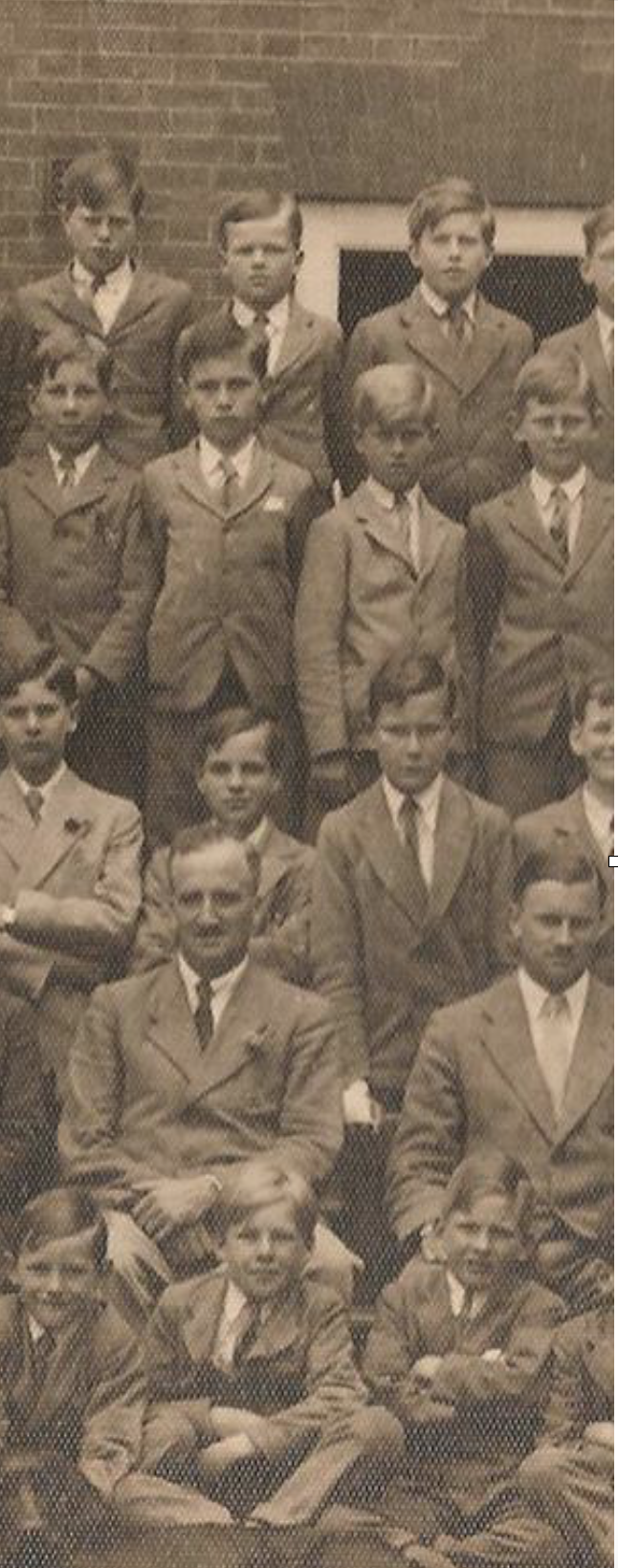
Prince Philip was quite a strange little boy in the eyes of his peers at Cheam. He had been born in Greece, exiled to France and his early education had been in an American school in Paris. He was described as being a "rugged, boisterous ... but always remarkably polite" boy by the school’s principal, Donald MacJannet.
In 1928, Philip was sent to the UK to attend Cheam School. When not at school he lived with his his maternal grandmother at Kensington Palace and his uncle, George Mountbatten, 2nd Marquess of Milford Haven, at Lynden Manor in Bray, Berkshire. The following three years proved to be very challenging for the young prince, all four of his sisters married German noblemen and moved to Germany, his mother was diagnosed with schizophrenia and committed to an asylum, and his father moved to Monte Carlo and set up home with the Countess Andr ́ee de La Bigne. Philip had little contact with his mother for the remainder of his childhood.
It must have been hard for the Prince to fit in with his very ’British’ classmates who were still anti the Bosch having grown up fed on their fathers’ war stories. Bill and Bob had a war hero for a father, who had also escaped from the IRA. They had a loving mother too, whereas Philip had an exiled father who had turned his back on his family and was living with another woman in a shameful existence in Monaco and Philip’s mother was gradually sinking into madness. To top it all his sisters had joined the ’old enemy’ by marrying Germans. The Prince’s eight and nine year old companions didn’t have the maturity or the insight to see behind the façade of this troubled child, nor did they have the skills to understand the pain their fellow pupil was suffering: they didn’t have the patience and perhaps weren’t as kind to him as they should have been.
It wasn’t until 1937 that the Prince saw his parents again and this was after his sister Cecilie, her husband (Georg Donatus, Hereditary Grand Duke of Hesse), her two young sons and her mother-in-law were killed in an air crash at Ostend; Philip, then sixteen years old, attended the funeral in Darmstadt.
p34 Heald, Tim (1991). The Duke: A Portrait of Prince Philip Heald [1991]
p69 Brandreth, Gyles (2004). Philip and Elizabeth: Portrait of a Marriage. London: Century. ISBN 0-7126-6103-4
p205 Vickers, Alice, Princess Andrew of Greece Vickers [2003]
p273 Vickers, Hugo (2000), Alice, Princess Andrew of Greece, London: Hamish Hamilton, ISBN 0-241-13686-5
Years later Bob had the opportunity to meet his old classmate again. Bob was Rector of Barnwell in Northamptonshire where the Duke and Duchess of Gloucester were resident. He was invited, along with his wife Maureen, to the 21st Birthday party of Prince William of Gloucester. The Duchess was keen to present Bob and his wife to the Queen and Prince Philip, especially as she knew that the Prince and Bob had been at school together. However when the moment came, the Queen arrived to greet the couple but Prince Philip was nowhere to be seen. When the Duchess enquired as to the whereabouts of the Prince she was informed that he ’was busy’ dancing with Princess Margaret. One wonders whether he’d not forgotten the egg incident and decided to get his own back on Lucas Minor with a right royal snub!
Marlborough
Bill and Bob followed their father and uncles to Marlborough. They too had to cope with the deprivations the former generation had endured at the school. Bob in particular struggled with the primitive bathroom facilities. Having inherited the Lucas shyness gene, he found it very hard to deal with the lack of privacy.
A Major J. Mullins, remembered the third week of September 1934, when ’about twenty new boys eyed each other critically and sheepishly’ as they arrived for their first term at Marlborough. Among them was Bill, 'a tall ungainly youth with a stutter who spent more time than most boys flicking his unruly, seldom brushed hair out of his eyes. Because of his height and his long limbs, he was rather clumsy, and if ever an inkpot was upset or someone’s books knocked on the floor, it was unusual for Lucas not to have had a hand in it. Being a little out of the usual, he got his leg pulled a lot, but always responded in good part. He went his own way, caring little for what others might think, and was full of irrepressible fun'. Bill went on an Inter-varsity Christian Boy’s Camp whilst at Marlborough and this was when he made the decision to become a committed follower of Christ, dedicating his life to God. He never forgot his debt of gratitude to the camp and in later years, whenever he was able, he would volunteer to help.
Extract from ’Practical Christianity’ magazine of The Officers’ Christian Union 1952 edition
Marlborough provided ’a tremendously rigorous education, both physically and intellectually’, wrote Alex Moulton who was in the year above Bill. The boys ’had to go on things called ”sweats” (long runs into Savernake Forest)’ They were taught in classes of about 20. ’It was very much blackboard teaching, going through examples, with [the master] walking around seeing how we were getting on. We were fairly senior, so discipline issues didn’t arise. We were just anxious to learn.’ The masters ’were very helpful with personal tuition; you could always see them out of hours if you were struggling on a particular point. We had prep at about seven in the morning, before chapel and breakfast.’
Bill and Bob’s house master at Marlborough was the wonderful Mr ’Jumbo’ Jennings. Not only was he very kind to the boys but also to their little sister who was very taken with her brother’s stories of their inspirational house master. Jennings had a knack of seeing the talents of the individual boys and of steering them in the right direction. Alex Moulton* described how his ’wonderful, sensible housemaster, R A U Jennings’ who seeing that he was never going to be a mathematician, switched him ’to the Woolwich Sixth, the special stream set up to prepare those boys who were going into the Royal Engineers/ Royal Artillery training college at Woolwich. It concentrated on a more practical form of mathematics’ Jennings knew that this would be more appropriate for Moulton who went on to study at Kings College Cambridge and became a famous mechanical engineer.
Although Alex Moulton didn’t go to Woolwich, Bill did and Jumbo Jennings wisely steered him into the Woolwich set where Bill worked hard not finding the work easy; but like his father, he rose to the challenge.
Alex, like Bill, was taught maths by Mr E.G.H.Kempson. ’He was a splendid man, very athletic, and famous for having taken part in one of the first ascents of Everest in the Twenties. Kempson drilled into me the fundamentals of statics and dynamics, which combine to form mechanics’ commented Moulton. Kempson’s athleticism and adventurous spirit, combined with his mechanical mathematics knowledge was ideal in being a master to inspire boys to apply to Woolwich and the Royal Engineers. This was what Bill did.
Bob was not keen on school-work and was fairly lazy, often getting into trouble. However he was in continuous competition with his brother and it was Bill who always seemed to win! Bob appeared to excel in maths and science whereas Greek was a far greater challenge which he had to repeat three times before he passed. According to the Marlborough Archives: ’In the Summer of 1937 he passed his School Certificate in Geography, Elementary Maths, Additional Maths and Science. In the Summer of 1939 he is recorded as taking his Higher School Certificate, majoring in Maths and sitting Physics as a subsid. subject.’ Although he never put any pressure on his sons to follow a particular career path, CHTL was hoping that his second son would end up in the bank; but with war looming Bob was eager to join up and do his bit.
*Dr Alex Moulton CBE, mechanical engineer, invented the revolutionary Hydragas and Hydrolastic suspension systems installed on millions of Minis and other cars. He also created the small-wheeled, two- piece Moulton bicycles, tens of thousands of which were sold in the Sixties and which are still manufactured today.
Men who set wheels in motion magazine article Published in TES Newspaper on 24 January, 1997 By: Alex Moulton
Tomorrow - CHTL takes up a new hobby to help the war effort...